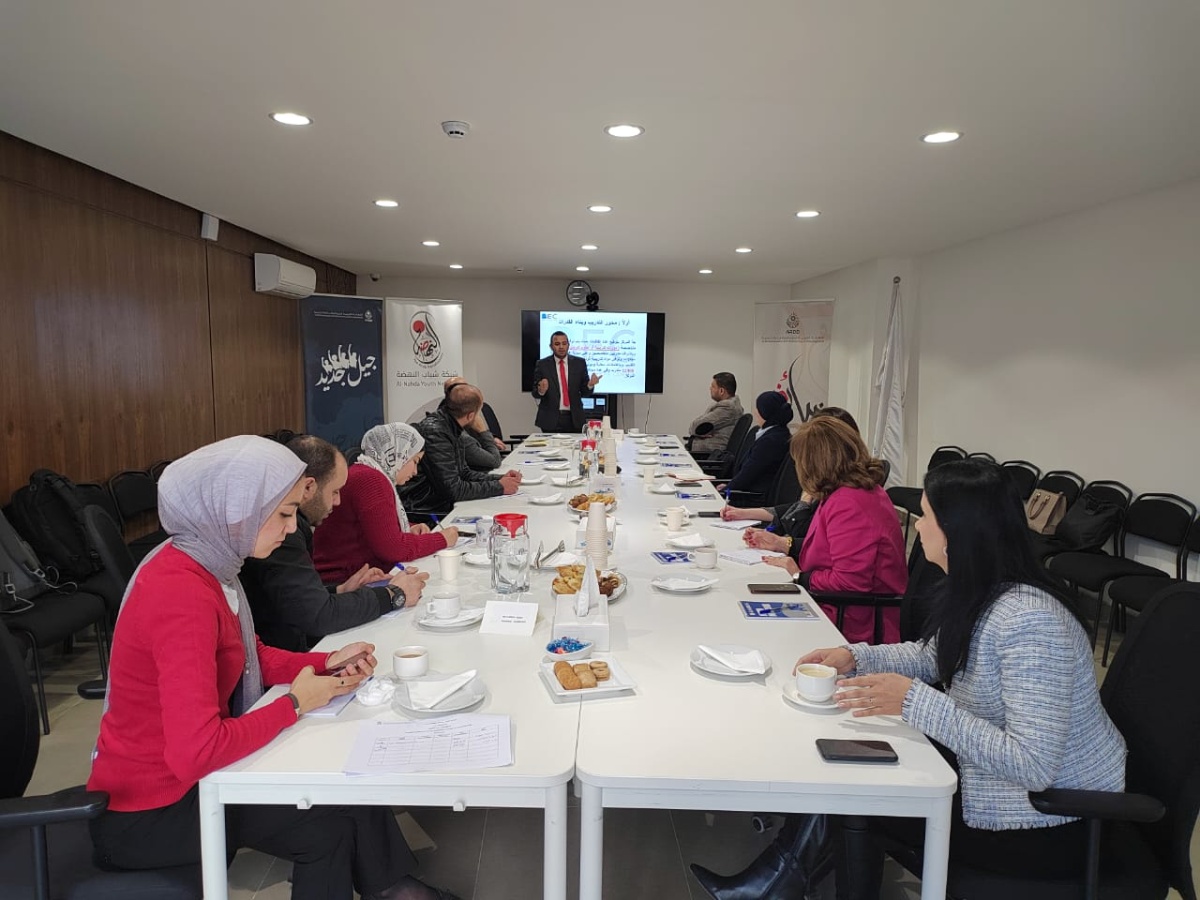For many years, and under various circumstances and crises, civil society organizations have acted as the “main pillar of support” for the role of the government, especially in times of emergency; due to their ability to offer a faster response to reach the communities targeted by these humanitarian interventions. Hence, this requires developing their capacities, specifically in the field of relief.
Within that perspective, and in order to understand the vital role of civil society institutions in crisis management and response to natural disasters and how to prepare them for that role, the fifth coordination meeting came in the frame of the Coordination of Youth Institutions, which was called for by the Arab Renaissance for Democracy and Development (ARDD), Monday, February 27, 2023. The meeting hosted the Jordanian Red Crescent Society to learn more about their relief work.
This meeting also introduced the work of the Naya Community Network and the Better Environment Center for Training and Development, as part of a series of meetings in the framework of the New Generation project, which aims to enhance cooperation between youth organizations, as well as promoting the importance of collective action to influence positive change and make a tangible difference in our societies.
“In humanitarian work, it is important to focus on the needs of the community, and then proceed to provide relief services,” said Hazem Al-Fuqaha, Executive Director of the Better Environment Center for Training and Development, speaking about his center, which was established in 2015 in the village of Dhiban in Madaba, and that works to provide platforms for young people to influence their communities.
Al-Fuqaha also pointed out that the center provides a range of local and external training programs and tools for young people, as well as offering training grants to underprivileged students, maintaining schools and homes for disadvantaged families, and securing Eid clothing for children. In the same context, he explained that the center faces several challenges, represented by the complexity of some legal procedures related to financial support, and challenging the prevailing ideas among some individuals in local communities, in addition to the difficulty of reaching people in remote areas, as well as the lack of coordination between operational institutions.
Raafat Badran, Executive Director of the Naya Community Network, stressed that the idea of establishing the center came from a simple dream, and as a result of the need for and the lack of social, economic, and environmental justice in Zarqa Governorate. The center is a youth community platform that aims to empower individual and institutional youth capabilities and connect them to opportunities, as well as providing a safe space for youth-led efforts that work towards positive change.
Regarding the challenges facing the Naya network, Badran stated that there are “ready-made” projects that do not meet the needs of the community, underlying the importance of empowering local organizations to continue their work by reconsidering the issues of financial stability and social security for workers, in order to enhance their knowledge and capabilities.
For her part, the head of the Jordanian Red Crescent Society’s media unit, Rania Abdul Dayem, said that the Society, which was established in 1948, works to coordinate relief efforts and help victims in natural disasters, in addition to providing a range of health and social services, and improving the conditions of underprivileged groups, pointing out that the principles of work in the Society are based mainly on humanitarian considerations, and thus on impartiality and neutrality.
In respect to the relief role of the Society, Al-Dayem pointed out that it focuses on education and raising awareness in the local community on first aid, promoting the concept of volunteering among individuals, providing humanitarian services, paying attention to the mental health of individuals and protecting family ties, in addition to building the capacities of volunteers to address crises, stating that the lack of youth civil society institutions specialized in relief work is due to the problem of the large amount of funding needed for this work, in terms of equipment and training staff, etc.
As for the role of civil society organizations in responding to disasters and crises and how to prepare them in this context, Al-Dayem saw that establishing civil society institutions working in the field of relief would be costly, owing to the high cost of training and tools needed for this purpose, explaining that these institutions could be turned into a real asset by raising their awareness and educating them on dealing with first aid, to be able to respond in times of crises and disasters.
Finally, the participants recommended the need to respond to natural disasters and mutual support between civil society institutions, as well as cooperating and coordinating with the government, stressing the need for a clear and long-term strategy that’s based on the foundations and study of the reality of local communities and their needs, in addition to the need to participate in relief work, due to the inability of the Red Crescent Society to cover all humanitarian needs on its own, with the importance of training civil society institutions on first aid in all governorates.


